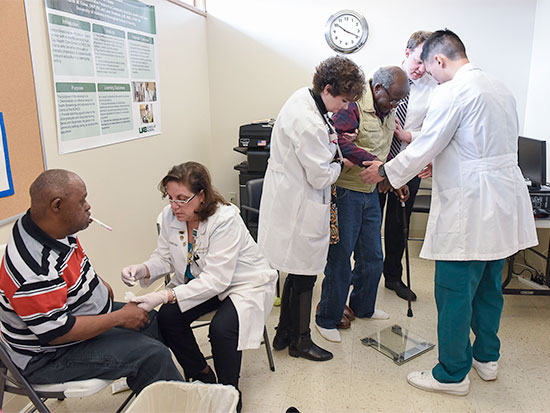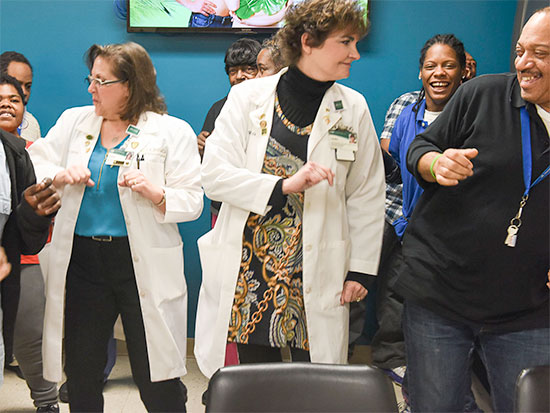 Under the supervision of their instructors, the students help take basic vital signs like blood pressure, temperature and weight. Every Tuesday morning, clients greet a handful of nursing students with hugs, smiles and fist-bumps when they arrive for their appointments. The students then get to work taking vital signs, checking their weight and asking about the nutrition of dozens of adults who attend the Wylam Adult Day Health Care Center in Birmingham.
Under the supervision of their instructors, the students help take basic vital signs like blood pressure, temperature and weight. Every Tuesday morning, clients greet a handful of nursing students with hugs, smiles and fist-bumps when they arrive for their appointments. The students then get to work taking vital signs, checking their weight and asking about the nutrition of dozens of adults who attend the Wylam Adult Day Health Care Center in Birmingham.
“You can’t have a bad day here,” said Angel Miller, a nursing student at the School of Nursing at the University of Alabama at Birmingham.
“They are such a loving group,” said Alejandra Hernandez, a nursing student from Birmingham. “When they arrive in the morning, they run into the room to give us hugs. I love being here and caring for them.”
Since 2014, UAB’s nursing students have been visiting the adult day health care center in Wylam to help provide health assessments to the clients, many of whom have mental or physical disabilities and need daytime supervision when their family caregivers are at work.
Under the guidance of Karen Coles, DNP, an instructor in the School of Nursing, and Laura Steadman, Ed.D., assistant professor in the School of Nursing, the students provide basic health assessments to the center’s 67 clients. If someone has a wound that needs to be treated, they clean and bandage it. If it is clear that one of the adults has not been properly bathed in days, they bathe him. For these students and their instructors, no task is too small or too large.
“We know in many cases that, if we don’t do it, no one will do it,” said Yalanda Muhammad, manager of the Wylam Adult Day Health Care Center. “I appreciate what they do when they come in because, if all they did was take their blood pressure and left, the clients would not be engaged with them. They go the extra mile.”
| “It lets the attendees know someone actually cares and that there is someone out there looking out for them, whether they are being taken care of at home or not. They understand that somebody actually wants to make sure they are OK. When they see the nurses and the students, they get excited.” |
The partnership began in 2014 when Coles worked with the center as a clinical faculty member for the School of Nursing’s Community Course. She learned that they did not have a consistent person providing basic medical care and decided she and her students could fill the void.
“I reached out, and we spent a semester with my students doing that,” Coles said. “At the end of the semester, the manager said, ‘what are we going to do now?’ So, it became my faculty practice, and we have been bringing students here ever since.”
The partnership between the adult day health care center and the School of Nursing benefits both the students and the clients.
“It lets the attendees know someone actually cares and that there is someone out there looking out for them, whether they are being taken care of at home or not,” Muhammad said. “They understand that somebody actually wants to make sure they are OK. When they see the nurses and the students, they get excited.”
“A lot of the students have not had an opportunity to care for a vulnerable population like this one,” Coles said. “It allows them to see what is really here in our world locally. It stretches them to use their most tender loving care with these adults.”
 While the nurses and their students provide medical care, they also spend time dancing and often singing with the clients at the end of each visit.Figuring out how to communicate to provide care is a challenge the students often encounter. Some of the clients may not understand something that may seem intuitive to others, like brushing teeth or using a thermometer.
While the nurses and their students provide medical care, they also spend time dancing and often singing with the clients at the end of each visit.Figuring out how to communicate to provide care is a challenge the students often encounter. Some of the clients may not understand something that may seem intuitive to others, like brushing teeth or using a thermometer.
“Some of them are nonverbal, so they don’t speak back to you. You have to watch their faces to see if they are understanding,” explained Abby Sims, a nursing student from Fultondale. “You have to think of different ways to help them understand the point you are trying to get across. We are learning from each other and learning to provide care out of the box.”
“I act things out more,” said Ashley Reid, a nursing student from Birmingham. “With a thermometer to take their temperature, I act it out by opening my mouth and pointing to where it will go. We do the same when it comes to brushing their teeth. We will brush ours next to them so they can see what we do and then they mimic us.”
Being exposed to these types of clients has also been eye-opening for many of the students.
“One of the attendees told me she doesn’t have air conditioning in her house,” said Amanda Shepard, a nursing student from Birmingham. “You don’t think about that here; you assume everyone here has air conditioning. To me, it is heartbreaking, and it’s great that they have a place to go to get out of the heat.”
“I think they were shocked when they came out here first and realized we were coming every Tuesday,” Steadman said. “They didn’t realize this community was really in their backyard and the need for this type of care exists at home.”
The experience not only shines a light on the issues in their community, but is shaping the direction of these students’ careers.
“I’ve always wanted to do some type of community health, but I always thought I had to go across the country or out of the country on a mission trip,” Sims said. “This has helped me realize I can do it here. There are a lot of opportunities to help people in need here, and that’s something I didn’t necessarily realize until this experience.”
As for the adults who attend the center, it is the time spent with the students that means the most.
“They just make us feel happy,” said Ramona McIntyre, one of the center’s clients. “They help me feel better and let me know I’m healthy. The students dance with us and sing with us. They make our days happy and joyful.”
“I always say the same thing. You can come to the center in a bad mood, but your mood automatically changes when you get here because the clients are always happy,” Steadman said. “There are no bad days.”